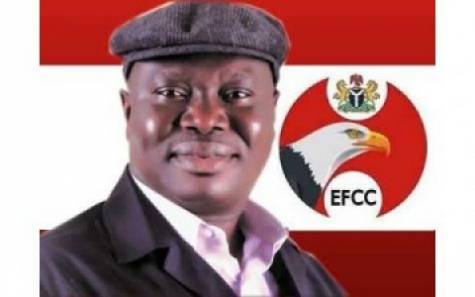Crime
600 Million Fraud: Supreme Court Sends Former Lagos Speaker Ikuforiji’s Aide Back For Fresh Corruption Trial

The Supreme Court in Abuja has upheld a Court of Appeal decision which set aside the ruling of a Lagos Division of the Federal High Court that cleared former Speaker of the Lagos State House of Assembly, Mr. Adeyemi Ikuforiji, and Mr. Oyebode Atoyebi, of money laundering charges.
In a ruling delivered by Justice Inyang Okoro, the apex court held that that appellate court was right in declaring that the Economic and Financial Crimes Commission (EFCC) had established a prima facie case against Mr. Atoyebi, an aide to Mr. Ikuforiji.
The Supreme Court will deliver a separate ruling on Mr. Ikuforiji’s application on January 15th, 2018.
The Lagos Division of the Appeal Court had, in November 2016, also ordered that a fresh trial is commenced before another judge other than Justice Buba, the federal high court judge who had handled the case.
Justice Buba had on September 26, 2014, discharged Mr. Ikuforiji and his aide of a 54-amended count charge of conspiracy and laundering the sum of N500 million belonging to the Assembly.
The EFCC said the cash payments were above the threshold set by the Money Laundering Act without going through a financial institution.
The offenses, according to the EFCC, contravenes the provisions of Sections 15 (1d) and 16(1d) of Money Laundry Act, MLA, 2004 and 2011.
The trial judge, who discharged the Speaker and Mr. Atoyebi, while ruling on a no-case submission filed by the accused persons held that the EFCC failed to establish a prima-facie case against them.
Dissatisfied with the ruling, the EFCC through its counsel, Mr. Godwin Obla (SAN), filed the Notice of Appeal dated September 30, 2014.
Mr. Obla asked the Court of Appeal to hold that Justice Buba erred in law when he held that counts two to 48 were incompetent because they were filed under Section 1(a) of the Money Laundering (Prohibition) Act, 2004 which was repealed by an Act in 2011.
The EFCC further argued that the lower court erred in law when it held that the provisions of Section 1 of the Money Laundering (Prohibition) Act, 2004 and 2011 only applied to natural persons and corporate bodies other than the government.
The commission also submitted that the trial judge erred in law when he held and concluded that the testimonies of the prosecution witnesses supported the innocence of the respondents.
Following the decision of the Appeal Court against them, the defendants headed to the Supreme Court to overturn the ruling of the appeal court.
According to the grounds of Appeal (nine in total) filed by Mr. Atoyebi before the apex court, the court of appeal “misdirected themselves in law” by concluding that his preliminary objection challenging the competence of some of the charges learned more on technicalities than substantial justice.
Mr. Atoyebi also stated that the appellate court erred in law when it held that Mr. Ikuforiji, who was the Speaker of the House at the time, was an individual in his dealings with him.
He further stated that the court of Appeal erred in law when it held that there were no material contradictions in the evidence led by the EFCC witnesses as to render their evidence unreliable.
“The findings of fact by Buba (judge) which was not appealed against found that there was an admission against interest in the evidence of prosecution witness,” said Mr. Atoyebi.
“The trial court found that ‘both the evidence in chief and one extracted under cross-examination of PW2 constitute an admission against the prosecution. The conclusion of the Court of Appeal amount to a review when there was no appeal against findings.”
But in its response, the EFCC held that the provisions of the Money Laundering Act are “clear as day.”
“There is no requirement of guilty mind or knowledge being part of the offense,” the Commission stated in its brief before the Supreme Court.
“The source of the cash payment is immaterial. As aptly held by the lower court, once the cash paid or accepted by either an individual or a body corporate without passing through financial institution is above the threshold amount, the offense is completed,” EFCC argued.
-
Society News4 years ago
Jamaican man beheads wife after finding out their 6 kids are not his
-
Society News6 years ago
EXCLUSIVE: The Complete Story of Dolapo Awosika, John Fashanu and Prophet Kasali Sex Mess
-
News4 years ago
Pastor Osagie Ize-Iyamu, His Membership Of Secret Cult, And Other Issues Touching On His Public Credentials Examined by Barr. PATRICK I. BIOSE
-
News4 years ago
BREAKING: Ajimobi’s daughter-in-law blast Gov. Makinde, says gov can’t surpass ex-Oyo gov
-
News4 years ago
BREAKING: 2 arrested as NAF begins investigations into Tolulope’s death
-
Crime5 years ago
Exclusive: Female Aide Fingered In Oko Oloyun’s Murder + Banking Transactions That Nailed Husband
-
News4 years ago
BREAKING: Police take over Edo House of Assembly as APC, Oshiomhole move to seize control
-
Society News5 years ago
The Rise and Fall of “Jumoke The Bread Seller”
You must be logged in to post a comment Login